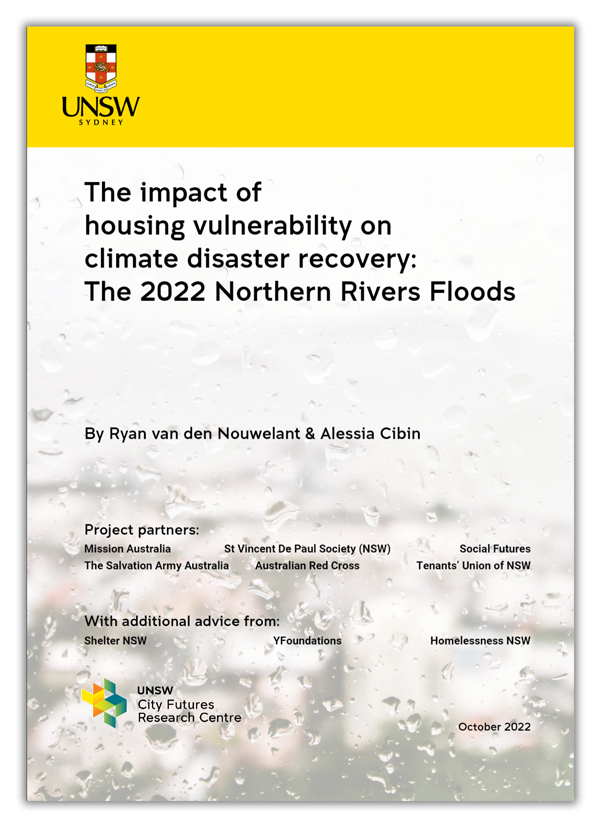Research: Northern Rivers floods expose flaws in NSW housing system
25/11/2022
As flooding impacts more NSW communities, new research from UNSW City Futures Research Centre, jointly commissioned by the Tenants' Union of NSW along with Mission Australia, St Vincent de Paul Society NSW, Social Futures, The Salvation Army Australia, Australian Red Cross shows action needs to be taken to safeguard regional Australians against homelessness and displacement as severe weather events become more common.
Floods and housing: the impact of housing vulnerability for recovery

The impact of housing vulnerability on climate disaster recovery: The 2022 Northern Rivers Floods looks at housing vulnerability and climate change, focusing on the Northern Rivers eight months after the severe floods earlier this year. The researchers, Ryan van den Nouwelant and Alessia Cibin, found that regional housing markets cannot withstand widespread property losses caused by natural disasters, like floods, because there is limited rental stock. The result is that more low-income renters are being displaced, while others are being left with little choice but to accept living in homes that need repairs, or are otherwise unsafe. This is because they risk receiving a no-ground eviction as a result of simply asking for repairs.
Homelessness support services, not adequately resourced to deal with homelessness even prior to disasters, are being called on to help even more people, while their volunteers and workers are also flood-impacted. People who were at risk of homelessness prior to the floods now face additional years of ongoing uncertainty because there is not enough social housing available. Social housing has dropped to 4.7% of housing stock in NSW and this exposes people throughout the state to increased likelihood of ongoing risk of homelessness in the wake of natural disasters.
Access to affordable housing in the Northern Rivers was already at crisis point before the floods with 1 in 25 of the state’s social housing waiting list applicants being in the area. With risks of natural disasters increasing due to climate change, there is a strong need for a well-planned and better co-ordinated response to meeting people’s housing needs post-disaster, and building a more resilient system.
Recommendations
The report recommends:
- Building more social housing stock in low-risk geographic areas
- Better protections for renters, such as ceasing no-fault evictions, at least in periods when the private rental market fails due to natural disasters
- Better resourcing for responses to homelessness and housing instability in periods of natural disasters
- More detailed planning around the medium-term housing solutions to be implemented following a disaster such as ‘pod homes’
- Improving knowledge management around the housing system, so disaster preparedness and planning can reflect data about dwellings in flood-prone land and likely demand from rough sleepers during flood events
- Providing transport subsidies and public and community transport options to mitigate the impacts of displacement and dislocation from existing community connections.
Media on floods and housing
- Joint media release: 24 November 2022
- ABC North Coast interview with Ryan van den Nouwelant (at 2.04.15)
- ABC North Coast online: Lismore flood victims in grip of housing crisis still as report urges change to cope with disasters
- The Age: 'Ruined my life': Renters like April are flood disaster's forgotten victims
- Yahoo News: Housing needed for NSW flood impacted



